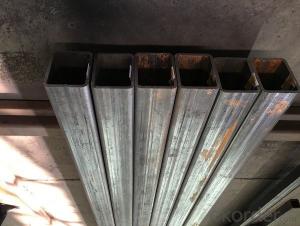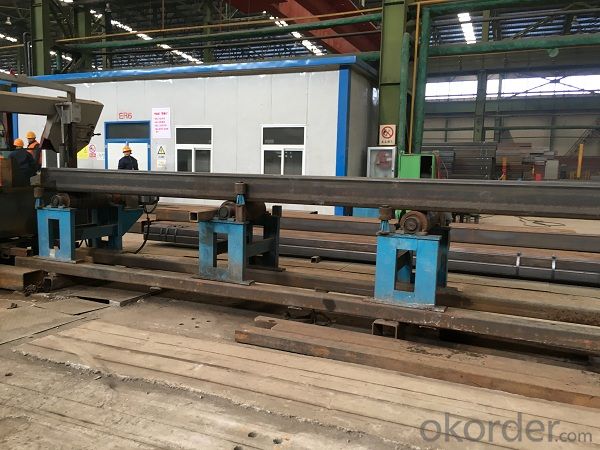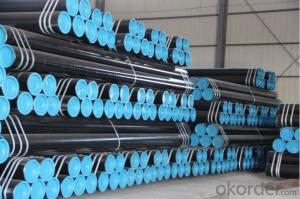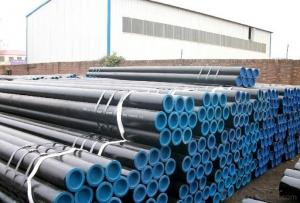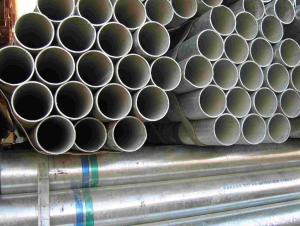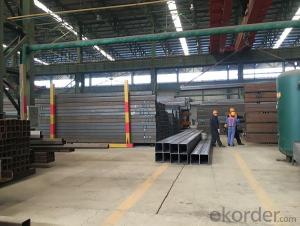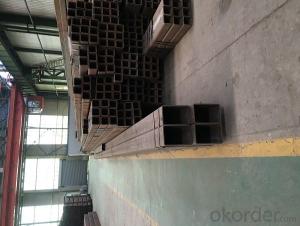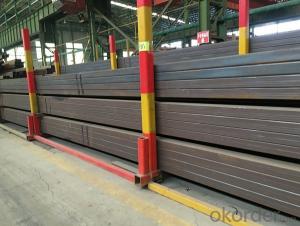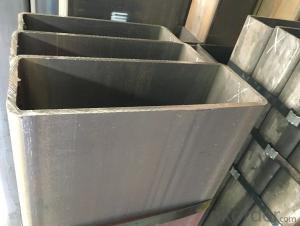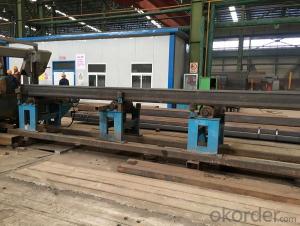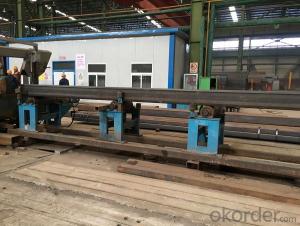National standard low carbon square rectangular tube
- Loading Port:
- Tianjin
- Payment Terms:
- TT OR LC
- Min Order Qty:
- 15 m.t.
- Supply Capability:
- 9800 m.t./month
OKorder Service Pledge
OKorder Financial Service
You Might Also Like
Specification
1、Structure of National standard low carbon square rectangular tube:
Square tube, square tube is a kind of call and rectangular tube, is equal and not equal to the length of steel pipe. Is the strip through the process of processing roll system. In general is the strip through the demolition of the package, flat, curly, welded to form a circular tube, and then rolled into a square tube and then cut into a square tube and then cut into the required length.
2、Main Features of National standard low carbon square rectangular tube:
• High manufacturing accuracy
• High strength
• Small inertia resistance
• Strong heat dissipation ability
• Good visual effect
• Reasonable price
3、 National standard low carbon square rectangular tube Specification:
Standard | GB, DIN, ASTM |
Grade | 10#-45#, 16Mn 10#, 20#, 45#, 16Mn |
Thickness | 1.5 - 25 mm |
Section Shape | Square and rectangular |
Outer Diameter | 20*20 mm-------400*400mm 20*30mm*300*500mm |
Place of Origin | Tianjin, China (Mainland) |
Length | 3-12M |
Outer Diameter | 20*20 mm-------400*400mm 20*30mm*300*500mm |
Grade | 235B 345B |
Standard | ASME, ASTM |
1) Material:(ASTM A 106/A53 GRB.API5LGRB,GB,235B,345B
2) Specification range:OD: 20*30mm----300*500mm 20*20 mm---400*400mm ,WT: 1.5 - 25 mm ,length:3-12m or according to the requirement of clients.
3) Excutive standards:GB,ASME API5L.ASTM A 106/A53,Despite of the above
4) Surface:black lacquered,varnish coating or galvanized.
5) Ends:Beveled or square cut ,painted.
6) Packing:bundles wrapped with strong steel strip,seaworthy packing.
4、Packaging & Delivery
Packaging Details: | seaworthy package,bundles wrapped with strong steel strip |
Delivery Detail: | 15-30days after received 30%TT |
5、FAQ of National standard low carbon square rectangular tube:
①How is the quality of your products?
Our products are manufactured strictly according to national and internaional standard, and we take a test
on every pipe before delivered out. If you want see our quality certifications and all kinds of testing report, please just ask us for it.
Guaranteed: If products’ quality don’t accord to discription as we give or the promise before you place order, we promise 100% refund.
②How about price?
Yes, we are factory and be able to give you lowest price below market one, and we have a policy that “ for saving time and absolutely honest business attitude, we quote as lowest as possible for any customer, and discount can be given according to quantity”,if you like bargain and factory price is not low enough as you think, just don’t waste your time.Please trust the quotation we would give you, it is professional one.
③Why should you chose us?
Chose happens because of quality, then price, We can give you both.Additionally, we can also offer professional products inquiry, products knowledge train(for agents), smooth goods delivery, exellent customer solution proposals.Our service formula: good quality+good price+good service=customer’s trust
SGS test is available, customer inspection before shipping is welcome, third party inspection is no problem.
6、 National standard low carbon square rectangular tube Images:
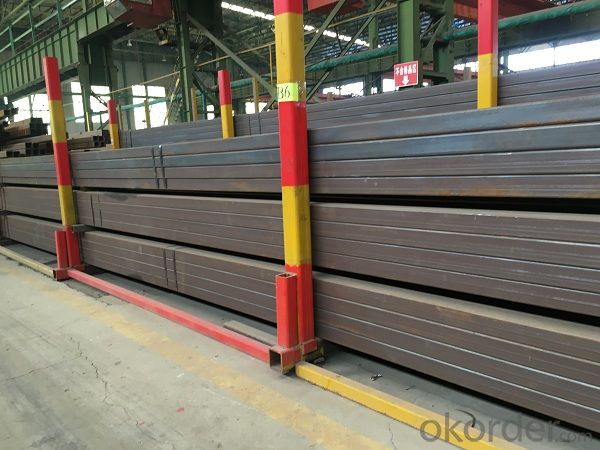
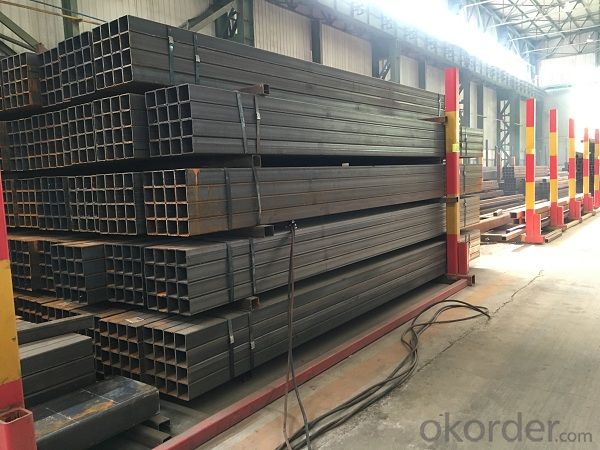
- Q: How are steel pipes inspected for compliance with industry standards?
- Steel pipes are inspected for compliance with industry standards through various methods such as visual inspection, dimensional checks, non-destructive testing, and mechanical testing. Visual inspection involves examining the pipes for any visible defects or imperfections. Dimensional checks ensure that the pipes meet the required measurements and tolerances. Non-destructive testing techniques like ultrasonic testing, magnetic particle inspection, or radiography are used to detect any internal or surface defects. Mechanical testing involves conducting tests to verify the mechanical properties such as tensile strength, yield strength, and hardness of the pipes. These inspections ensure that the steel pipes meet the required industry standards and are safe for use.
- Q: How does the price of steel pipes vary based on size and grade?
- The price of steel pipes tends to vary based on their size and grade. Generally, larger pipes and higher-grade steel tend to have higher prices due to the increased raw material and manufacturing costs involved. However, market demand and supply dynamics can also play a role in the price fluctuations.
- Q: How do you repair damaged steel pipes?
- To repair damaged steel pipes, the first step is to assess the extent of the damage. If it's a small crack or hole, it can be fixed using a steel-filled epoxy or a pipe repair clamp. However, for more significant damage, such as extensive corrosion or a large rupture, cutting out the damaged section and replacing it with a new pipe is usually necessary. In some cases, professional welding or soldering may be required to ensure a secure and leak-proof repair.
- Q: What are the different types of steel pipe bends for pipeline routing?
- There are several different types of steel pipe bends commonly used for pipeline routing. These include 90-degree bends, 45-degree bends, and custom bends with specific angles as per the pipeline design requirements. Each type of bend serves a specific purpose in redirecting the flow of fluids or gases through the pipeline while maintaining structural integrity.
- Q: Are steel pipes suitable for underground gas distribution?
- Yes, steel pipes are suitable for underground gas distribution. They have a high tensile strength, corrosion resistance, and can withstand extreme temperatures, making them an ideal choice for transporting natural gas underground. Additionally, steel pipes are durable and have a long lifespan, making them a reliable option for gas distribution systems.
- Q: How do you join steel pipes together?
- Steel pipes can be joined together using various methods, including welding, threading, and using mechanical couplings.
- Q: Can steel pipes be recycled after their useful life?
- Steel pipes can indeed be recycled once they have served their purpose. Steel, being an incredibly recyclable substance, can be recycled even in the form of pipes. The recycling of steel pipes entails the collection of used pipes, followed by thorough cleaning to eliminate any impurities, and finally transforming them into fresh steel products. This recycling process contributes to the preservation of natural resources, curbs energy usage, and limits waste generation. Moreover, recycling steel pipes aids in mitigating the environmental repercussions linked to the manufacturing of new steel.
- Q: What are the different grades of steel used in manufacturing pipes?
- There are several grades of steel used in manufacturing pipes, including carbon steel, alloy steel, stainless steel, and duplex steel. Each grade has distinct properties and characteristics that make it suitable for different applications and environments.
- Q: How are steel pipes protected from damage during transportation?
- Various methods are used to protect steel pipes from damage during transportation. One commonly employed technique involves applying protective coatings to the pipes. Materials like epoxy, zinc, or polyethylene are often used for this purpose, creating a barrier between the pipe and external elements. These coatings effectively prevent corrosion and damage during transit. In addition, steel pipes are frequently bundled together and secured using straps or bands. This bundling ensures that the pipes remain in place and prevents any shifting or rolling during transportation. Furthermore, padding or cushioning materials, such as foam or rubber, may be utilized to provide extra protection and reduce the risk of damage from impact or vibration. Sometimes, steel pipes are placed in crates or containers to provide further safeguarding. Crates are designed to snugly fit the pipes, offering a secure enclosure that shields against external forces. On the other hand, containers create a protective environment for the pipes, shielding them from the elements and potential impacts. To guarantee the safe transportation of steel pipes, proper handling and loading techniques are crucial. Pipes should be lifted and loaded onto transport vehicles with care, utilizing suitable equipment like cranes or forklifts to minimize the risk of damage. It is also essential to properly secure the pipes within the transport vehicle to prevent any movement or potential damage during transit. Overall, a combination of protective coatings, bundling, padding, and secure packaging or loading techniques is employed to ensure the safety of steel pipes during transportation. These measures guarantee that the pipes arrive at their destination in optimal condition, ready for use in various applications.
- Q: How are steel pipes insulated to prevent heat loss?
- Steel pipes are typically insulated using materials such as fiberglass, foam, or mineral wool. These insulation materials are wrapped around the pipes and securely held in place with tapes or clamps. This insulation layer acts as a barrier, reducing heat transfer and preventing heat loss from the steel pipes.
Send your message to us
National standard low carbon square rectangular tube
- Loading Port:
- Tianjin
- Payment Terms:
- TT OR LC
- Min Order Qty:
- 15 m.t.
- Supply Capability:
- 9800 m.t./month
OKorder Service Pledge
OKorder Financial Service
Similar products
Hot products
Hot Searches
Related keywords
